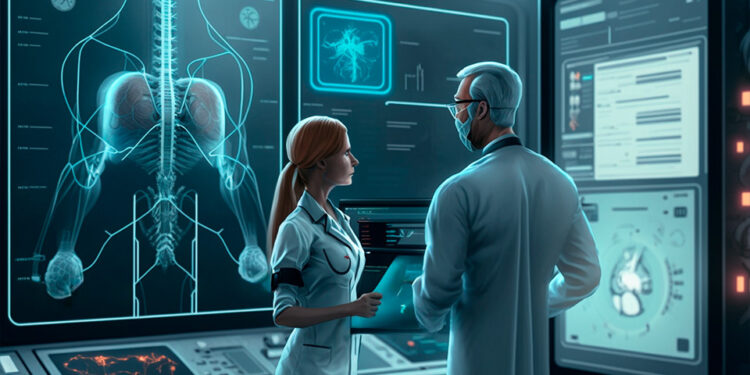Artificial intelligence developments are drastically changing the healthcare sector. Artificial intelligence (AI) will be used more and more in the healthcare industry as a result of the complexity and growth of data in the sector. Payers, care providers, and life sciences companies already use a variety of AI technologies. It has the potential to enhance diagnostic and treatment recommendation accuracy, enhance patient outcomes, expand access to care, and lower costs. Deep learning neural networks and machine learning algorithms can find patterns in enormous datasets to identify risks, diagnose illnesses, and gain insights that humans alone might not be able to. Medical scan analysis, disease detection, personalizing treatment plans, and other tasks are becoming easier for AI systems to do. Although AI won’t replace doctors and nurses, it can enhance their abilities and improve the personalization, accessibility, and cost of healthcare.
AI is being used more and more by healthcare providers to enhance the effectiveness and quality of care. AI is transforming healthcare and it is having a significant impact in more ways than one:
- Diagnosis and Prediction
The field of medicine has recently benefited greatly from artificial intelligence. Huge amounts of health data can be analyzed by AI systems to find patterns that can aid in diagnosis, treatment, and outcome prediction. In order to identify potential diagnoses, AI algorithms can find patterns in medical scans, tests, and health records. For instance, AI has been demonstrated to identify skin cancers and diabetic retinopathy through image analysis. AI can also review pathology reports, radiology scans, and patient symptoms to suggest potential diagnoses for doctors to investigate further.
AI systems can identify patterns that forecast the likelihood of specific medical events like heart attacks, strokes, or disease progression by analyzing large datasets of patient health records and outcomes. These forecasts can then be used by doctors to plan preventive measures for patients who are at risk. AI has been used, for example, to forecast the onset of dementia or the likelihood that heart failure patients will need to be readmitted to the hospital unexpectedly after being discharged.
- AI can also be used for Personalized Treatment.
With the aid of AI, it is possible to examine a patient’s particular traits, medical background, genetics, way of life, and environment in order to identify the treatments most likely to be beneficial to them specifically. By using a personalized approach to medicine, patients can avoid ineffective treatments and are given the care they require as quickly as possible. Personalized medicine powered by AI is a promising new area for enhancing health outcomes.
AI holds great promise for enhancing diagnosis, enabling predictive prevention, and enabling individualized care. By utilizing AI, doctors can deliver higher-quality care at a lower cost, assisting in the resolution of some of the most pressing issues facing modern healthcare systems.
- Surgical Robots:
Physical robots incorporated with AI can do a lot. Surgical robots give surgeons “superpowers,” enhancing their vision, ability to make precise, minimally invasive incisions, close wounds, and other surgical procedures. They were first approved in the USA in 2000. However, significant choices are still made by human surgeons. Gynecologic surgery, prostate surgery, and head and neck surgery are among the common surgical procedures performed using robotic surgery.
- AI-Powered Virtual Assistants and Chatbots
Virtual assistants and chatbots that can handle a variety of healthcare tasks that were previously handled by humans have been made possible thanks to artificial intelligence. A patient’s symptoms can be initially assessed by AI-powered software, which can also set up appointments, remind patients to take their medications, and provide basic health information.
AI-based virtual assistants and chatbots are being used by some hospitals and healthcare organizations to lighten the administrative burden on staff and give patients more convenient options. Chatbots, for instance, can handle initial triage by enquiring about patients’ symptoms and medical background. Based on its AI evaluation, the chatbot can then decide whether an appointment is required or whether self-care might be sufficient.
Additionally, patients are managing their care from home with the aid of virtual assistants. Reminder messages regarding dosages, refills, or follow-up appointments can help patients adhere to their treatment plans, which may improve their health outcomes. Common inquiries about a condition, prescribed medications, or self-care techniques can be instantly answered for patients. In addition to reducing pointless calls to doctors, this gives patients access to health information whenever they need it.
Patients’ access to information and interactions with the healthcare system are changing as a result of virtual assistants and chatbots.
AI AND THE FUTURE OF HEALTHCARE
AI has the potential to vastly improve healthcare. As AI continues to advance, it will transform the future of healthcare in several key ways:
- Automated Processes
Routine, repetitive tasks like paperwork, billing, and pharmacy orders can be replaced by AI. Automation of these procedures can lower healthcare costs and free up staff and medical professionals to concentrate on patient care. AI assistants could serve as virtual scribes to record patient interactions or deliver summaries following visits.
- Continual Monitoring
Real-time data allows AI to detect health changes early and alert physicians to signs of deterioration or complications. Continuous monitoring, especially for chronic conditions, may enable proactive care and better health management. Patients can be continuously monitored by wearable devices and sensors.
The impact on the healthcare sector will be enormous as artificial intelligence develops. AI will significantly and excitingly change the healthcare industry in the coming decades. Human doctors will still be necessary, but AI can improve their skills and increase access to high-quality care. Overall, as AI and human healthcare professionals collaborate to improve lives, the future of healthcare appears promising.
















